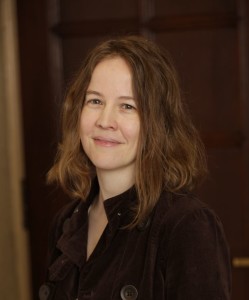 Dead Darlings contributor Jennie Wood has given us an insider’s view on the process of publishing her debut novel, A Boy Like Me. Jennie will celebrate the launch of A Boy Like Me at Machine in Boston on September 4, 2014, at 7:00 p.m.
Dead Darlings contributor Jennie Wood has given us an insider’s view on the process of publishing her debut novel, A Boy Like Me. Jennie will celebrate the launch of A Boy Like Me at Machine in Boston on September 4, 2014, at 7:00 p.m.
Recently, she spoke with us about A Boy Like Me, which is also the first novel to emerge from GrubStreet’s Novel Incubator program.
Dead Darlings: At its most basic level, your novel A Boy Like Me recounts the star-crossed romance of Peyton Honeycutt and Tara Parks. Did you conceive of the book originally as a love story, or did you have another agenda in mind?
Jennie Wood: I didn’t have an agenda in mind at all, certainly not a love story. What I wanted to do was write the story of a trans boy. Mainly because the subject is extremely important to me. I also wanted to write a story that was different from my own.
I was working on my graphic novel Flutter at the same time. Minus the sci-fi elements, Flutter is a story very close to my own—growing up in a small conservative town, uncomfortable in my own skin, thinking that life would be easier as a guy. However, there’s a huge difference between thinking that life would be easier as a guy and being a guy. With A Boy Like Me, here’s a boy born in a girl’s body and everyone thinks he’s a lesbian. As I was writing and revising it, one character began to see, love, and accept Peyton for who he is, and that’s Tara. So the love story came out of revisions, in the fleshing out of Tara.
DD: With the impending release of A Boy Like Me, I can’t help but return to the compare-and-contrast conversation we had after your graphic novel Flutter hit the streets a year-plus ago. The two volumes are clearly companion pieces, yet they feel quite distinctive in tone and content. What were you able to achieve using only words this time that you couldn’t with words and images combined?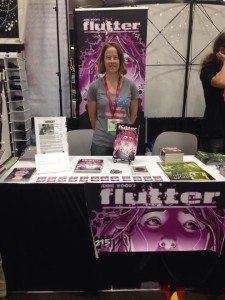
JW: Comics are a visual medium, and Flutter‘s a 50-50 collaboration with artist Jeff McComsey, so the main difference was that in writing A Boy Like Me as a novel from first person, I was able to tell Peyton’s story from inside his head, show his thoughts, dive into his internal landscape. In Flutter, we showed how people react to Lily as a girl and, after she shape-shifts, as a boy, but in A Boy Like Me, I got to show how Peyton reacts internally to people thinking that he’s a lesbian, etc. It’s using different writer muscles.
Flutter was a script, a blueprint, much like a screenplay that took a year to write and then another year of back and forth with Jeff on ideas and edits while he did the art. A Boy Like Me was a year of research, reading, interviews, etc., and then another 2-3 years of writing and revising. Through the words—Peyton’s words—the phrases he uses, his word choices, his observations, I was able to convey his feelings, desires, anxiety, confusion, and frustration in a way that I couldn’t in a project like Flutter.
DD: One of the aspects I admire most about your novel is the way you convey Peyton’s depth of feeling, especially his affection for Tara. Can you pick a scene and tell me about the choices you made in rendering Peyton’s emotional state?
JW: Thank you. There’s a scene with Peyton, his uncle, and his uncle’s girlfriend right after Peyton has returned with dinner from the diner in town that’s owned by a lesbian couple. On his way out of the diner, Peyton runs into Jason, a bully who teases Peyton about eating at THAT diner. So Peyton returns upset, but he can’t convey why he’s upset. He can’t eat even though he’s starving, and he can’t express how he’s really feeling. He knows deep down that he’s not a lesbian. He also knows there’s nothing wrong with being a lesbian, but he unleashes his anger towards the lesbian couple because he can’t say who he is, what he’s feeling.
With this scene, with every scene, I always returned to Peyton being a flawed human being like all of us, not a character. His emotions are complex. His anger is misdirected. He’s angry at Jason and his Uncle and his Uncle’s girlfriend for assuming that he’s a lesbian. He’s also angry at himself for not being able to say who he is. It’s a lot, especially for a 15-year-old, so I worked to show all those emotions through his inability to eat, speak, and through his misdirected anger.
DD: Right around that point in the book, Peyton begins to experience cognitive dissonance over his sexual orientation. Based on his attraction to Tara, the societal stereotype is that he’s a lesbian. But Peyton really identifies as a man. Can you discuss how you negotiated that turbulent section in the narrative?
DD: At that point in the narrative Peyton doesn’t understand the difference between gender identity and sexual orientation. He’s afraid of all of it so he just won’t even go there. And he doesn’t live inside his body because it’s foreign to him. It doesn’t feel right so he doesn’t even like to think about or touch his body. He’d much rather think about Tara’s body, which makes him very similar to a lot of us at the age of fifteen. He’s focused on his wants and desires. That’s the most important thing in the world for him—the only thing in the world. It’s all about Tara. However, Tara’s presence and her love for Peyton forces him to focus on himself and his body. It’s really their dance, that push and pull that helped me negotiate my way through that section.
DD: Can you talk about Peyton and Tara’s parents for a moment? You did a great job of allowing them to be present, but not too prominent, in their kids’ lives. What role does family play in this narrative?
JW: Like a lot of us at his age, Peyton sees most adults, especially Tara’s mother and his own mother, as obstacles to getting what he wants; therefore, they become a source of a lot of his teen angst. At the same time, he wants to be accepted by them even if he can’t always admit it. So family is a source of a lot of friction here.
Even though Peyton and Tara’s parents are not too prominent, there’s a lot of parenting going on elsewhere—Uncle RB is more Peyton’s father than Peyton’s father. Peyton’s best friend, Rebecca, and her mother provide more of a home for Peyton than his own mother does. Even though Peyton got a bum deal in terms of his parents, he is still surrounded by family, people who love him and want to help him. And, of course, they matter to Peyton so he fears losing or disappointing them. It amps up the tension for him.
I think so many of us end up being parented by people who are not our parents—that was my life—and it’s important to me to have that in fiction. I think people need to know that it’s okay if you’re not close with your parents. It doesn’t make you a bad person. You get your parenting and life lessons elsewhere growing up and those people need to be honored, the Uncle RBs of the world. They accept the responsibility, they rise up even though it wasn’t something they signed up for—that’s such a brave thing to do.
DD: This leads to the inevitable question about audience and genre. Do you consider A Boy Like Me to be a Young Adult novel at this point? Does it matter? I’m sure it would be tremendously comforting for any teenager wrestling with gender identity to read your book. Did you make editorial choices during the revision process that steered the narrative more directly into YA, or not really?
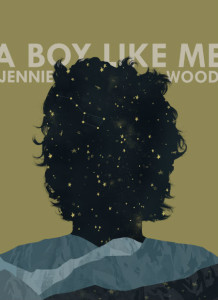
JW: Similar to not planning for A Boy Like Me to be a love story, I didn’t plan on it being YA. Early drafts of A Boy Like Me spanned thirty years and dealt with Peyton in the military, in college, and as an adult. But through workshopping in the Novel Incubator and revision, I focused more and more on the time in Peyton’s life when he first embraces who he is. That just happened to be his teenage years. I didn’t need to show the choices he makes later on, whether or not he decides on certain surgeries, etc. So the years I chose to focus on were based on character and plot, on when he accepts and embraces who he is, not to make it a YA novel.
I do think the YA label matters, because YA is a way for readers to look for and identify a kind of book in this day and age. And it’s not about one age group, it’s about a certain reading experience that a reader is craving. There are so many amazing writers in YA right now doing exciting things with the genre. Diana Renn, who you recently interviewed, and Malinda Lo are two great examples. It’s an accident that A Boy Like Me turned out to be YA, but a happy one.
DD: Speaking of the revision process, can you talk about the editorial partnership you and your editor pursued during the latter phases of this project?
JW: Kelly Ford is a talented writer and editor, and those two talents inform each other. Kelly and I met during the Novel Incubator and are writing partners, but in the latter phases of A Boy Like Me she took on the job as the book’s developmental editor and did a tremendous job. She worked through every page to make sure things like character intention, dialogue, and setting were all consistent. That was no easy task because the ages of the characters had changed as well as the time period due to recent revisions. Kelly would point out spots where the characters sounded or behaved too young, when there was a piece of furniture in the room that didn’t belong because of the new time period, when I’d used a word (Cheerwine) too many times (thirty), etc.
She also strongly encouraged me to add what ended up being important scenes, including two scenes to help round out Peyton’s mother. At that late stage, the last thing I wanted to do was add more scenes. You get to a point where you just don’t think you can look at the manuscript one more time. But Kelly’s work ethic matches, even exceeds, my own at times and I think that’s key. You want someone to push you beyond the point that you think you can go.
After working with Kelly for several weeks, I then worked with 215 Ink’s Michael Perkins, writer of the fantastic series Beware, on a final edit of the novel to have fresh eyes on it. Mike is also a talented editor and writer. I felt like the luckiest writer in the whole world for having the chance to work with those two individuals. They not only made A Boy Like Me a better novel, they made me a better writer.
DD: You’ve spoken extensively on Dead Darlings and elsewhere about independent publishers versus traditional. Given your partnership with 215 Ink on this project, and the unique material, how do you envision building audience for A Boy Like Me?
JW: It’s more about continuing a conversation than building an audience. I’m extremely blessed and lucky to have had the experiences that I’ve had in comics and with 215 Ink. In comics, and with indie publishers like 215 Ink, there’s no pressure to sell a lot of books right out of the gate.
I’ve sold more copies of Flutter Volume One this year than last year, when it was new. But the conversation doesn’t just happen at comic conventions. It happens online, at concerts, in line at the grocery store, everywhere. It’s about continuing the conversation that started with Flutter about gender, gender roles, society—the expectations that society places on those things, and expand that to A Boy Like Me and next year’s Flutter Volume Two. It’s about broadening the conversation, meeting more and more people who have their own story to tell and sharing, trading stories.
Here’s the thing that every writer needs to know—and I’ll say it every chance I get—don’t wait for anyone to give you a green light to get your work out there. And do not put your career in anyone else’s hands. Yes, it’s important to revise, revise, revise, but when it’s ready—get it out there. Your work needs to be in the hands of unbiased readers so you can have a conversation about it. That conversation informs you as a writer and helps you become a better writer like nothing else. It’s all about the conversation between the writer and the reader—the work is the conversation, but also the reaction, the feedback, the feeling the reader is left with after reading the work. ANYTHING that gets in the way of that conversation is static.
The hardest step in the writing process is letting go of your work and putting it out there, but it’s also the most rewarding and provides the most creative growth.
DD: My last question returns to the personal realm. If you had an hour to spend with a teenager who is struggling with gender identity or sexual orientation, what would you tell them and how might the story of Peyton and Tara inform that conversation?
JW: I don’t think I’d tell them anything unless they asked for advice. I’d listen.
People—not just teenagers—who are struggling with gender identity or sexual orientation get told so many things. Just recently (in 2014) I was told once again that being gay was my choice (by someone under the age of 30!) When I was coming out, I was told repeatedly that I just hadn’t found the right guy. My high school best friend told me that she was sorry she wouldn’t see me in heaven. Transgender individuals have it much worse because they have people asking them ridiculous, invasive questions.
I just needed someone to shut up and listen. So that’s what I would do if I spent an hour with someone struggling with gender identity or sexual orientation. Everyone has their story and they need to have the space to tell their story. A Boy Like Me will resonate with some people, but not everyone—and that’s more than okay—that’s the way it should be.
I think how Peyton and Tara’s story most informs any conversation about the struggle with gender identity or sexual orientation is that it shows that at any point in one’s struggle there’s someone out there willing to accept and support you for who you are and where you are, whether it’s a Tara or an Uncle or a therapist. You don’t have to arrive at a certain place in order to be supported and accepted and loved. But you do have to let that support and love in.
I was lucky to have people love and accept me while I was on my way to embracing and becoming comfortable with who I am. That love, those people are the reason I could write A Boy Like Me.
You can ask Jennie your own craft questions when she reads from A Boy Like Me on Thursday, September 4 at Machine in Boston. She will also be participating at the next Craft on Draft reading with fellow Novel Incubator alum E.B. Moore and Kate Racculia.


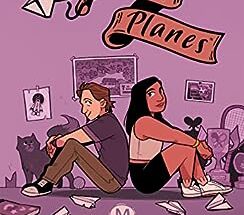
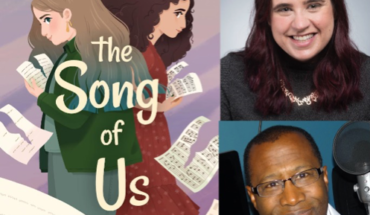
1 comment